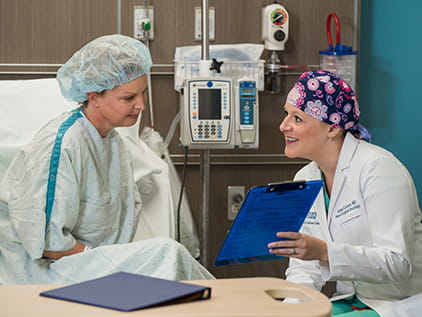Hepatobiliary Surgery
Hepatobiliary surgery covers procedures that treat disorders of the biliary system, which includes the liver, pancreas, gallbladder and bile duct. The biliary system regulates and produces bile, which is a fluid the body produces to help digest the fats in foods that have been eaten.
Specialists at The University of Kansas Health System are recognized leaders in the surgical treatment of common and rare disorders of the biliary system. As part of an academic medical center, our health system provides unique treatments and resources that may not be available elsewhere.
What is hepatobiliary surgery?
When a portion of the biliary system is experiencing a disorder due to disease or injury, surgery may be required to correct the problem. Hepatobiliary surgical procedures are designed to treat disorders of the bile system, typically arising from cancer of 1 or more organs.
Although there is a spectrum of procedures to treat specific conditions of the biliary organs, surgery takes 1 of 3 major forms: open, laparoscopic and robotic.
We offer a variety of appointment types. Learn more or call 913-588-1227 to schedule now.
Who can have hepatobiliary surgery?
Many disorders treated by hepatobiliary surgery are caused by cancer. The liver, pancreas and bile ducts all can experience the growth of tumors, both benign and malignant. These organs can also become cancerous when tumors in other parts of the body, such as the colon, metastasize and spread.
Because of this, most candidates for hepatobiliary surgery will be those who have received a diagnosis of cancer of the liver, pancreas and bile ducts. Some people with severe gallstones that cannot be passed normally may also need hepatobiliary surgery.
Hepatobiliary procedures can also be used to treat liver disorders arising from prolonged heavy alcohol usage or fatty liver disease. Some diseases such as hepatitis can also lead to a patient requiring surgery.
How does hepatobiliary surgery work?
There is a range of hepatobiliary surgeries available to doctors treating disorders of the biliary system. Some of the procedures available include:

Cancer care you can count on
The University of Kansas Cancer Center is 1 of fewer than 60 NCI-designated comprehensive cancer centers in the nation, and it's part of The University of Kansas Health System.
Benefits and risks of hepatobiliary surgery
Hepatobiliary surgery greatly improves the ability of people to survive cancer. It also benefits those who experience other disorders of the bile duct, liver and gallbladder. Surgeries of this nature can be lifesaving.
Like all surgical procedures, however, hepatobiliary surgery carries the risk of infection and bleeding. Blood clots and complications arising from anesthesia are also risks. If surgery was performed to remove cancer, there is also the chance for cancer recurrence.
What happens during hepatobiliary surgery?
The specific details of your surgery preparation, process and recovery time will vary depending on the condition that necessitates the surgery. Your doctor will give you all the information and instructions you need on what to expect before, during and after your procedure.
Why choose us for hepatobiliary surgery
At The University of Kansas Health System, we put the patient at the center of a comprehensive team of medical specialists. As part of a multidisciplinary team, our hepatobiliary surgeons work closely with other hospital specialists to develop individualized patient treatment plans.
All of our hepatobiliary surgeons are faculty members at The University of Kansas School of Medicine. As experts in their fields, they also teach the most effective, least invasive surgical techniques to other physicians.




